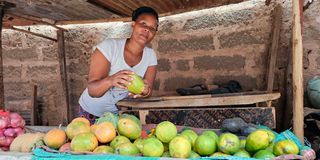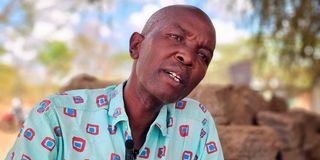'Where do we begin?' The ongoing plight of stateless widows in Taita Taveta

Naomi Mkimbo sells mangoes at Taveta market on November 7, 2024. In 2006, she married a primary school headteacher, but their union was never formalised; as a result, she lacks the necessary marriage certificate to apply for Kenyan citizenship.
What you need to know:
- Tanzanian widows in Taita Taveta County, remain in limbo without IDs, largely due to a lack of awareness about the citizenship acquisition process.
- Village elders are attempting to spread information through word-of-mouth, but without proper funding and structured outreach programs, their efforts remain limited to basic community meetings.
Last December, we published a story about stateless Tanzanian widows in Taita Taveta County, highlighting their challenges due to a lack of identity cards.
The main issue identified in the story was a lack of awareness among the widows regarding the process of acquiring Kenyan citizenship. To date, little sensitisation has been carried out to address this problem.
Charles Otieno, a village elder in Bura Ndogo A in Taveta, says he has been using word of mouth to reach out to the Tanzanian widows and women married in the area.
“I regularly meet with the Nyumba Kumi elders, whom I task with speaking to the Tanzanian widows to inform them that they must return to Tanzania to renounce their citizenship to begin the process of seeking Kenyan citizenship,” he says.

Charles Otieno, a village elder in Bura Ndogo A in Taveta sub-county, during the interview at Taveta in Taita-Taveta County on November 6, 2024.
According to Article 15 of the Constitution and Section 11 of the Kenya Citizenship and Immigration Act (2011), a foreign spouse is eligible to acquire citizenship through marriage, permitting them to apply for citizenship after legally residing in the country for seven years.
Becoming a Kenyan citizen would offer these women a myriad of rights, privileges, and benefits enjoyed by all Kenyan citizens, including the ability to enter and exit the country freely, reside anywhere in Kenya, vote, and own land and property in any part of the nation.
In Kimala location, sensitisation efforts have been limited. According to Violet Girigi, a village elder from Luduwai village in Taveta, a baraza was held at the chief’s office last Thursday, attended by nearly 100 people, including women. “One of the issues addressed was how Tanzanian widows can access identity cards,” she says.
However, she noted that with funding to facilitate outreach efforts, awareness could be extended to markets where the targeted women are more accessible.
“I know this form of sensitisation is limited, but if we had the means to reach the women in all corners of the villages, we could relieve the stress of not knowing what to do in these circumstances,” she says.
Naomi Mkimbo, the widow we interviewed for the original story, for instance, remains unaware of the necessary steps.
“So, where do I even begin if I return to Tanzania to renounce my citizenship?” she asks, when informed of what is expected of her before applying for Kenyan citizenship.
Naomi recommends disseminating the information at the markets, where there is a concentration of people who can then spread the word. “The information should be simplified so that we can understand it,” she suggests.


